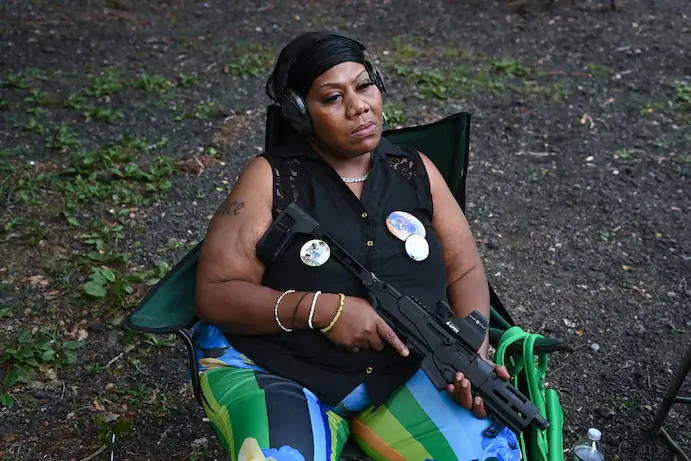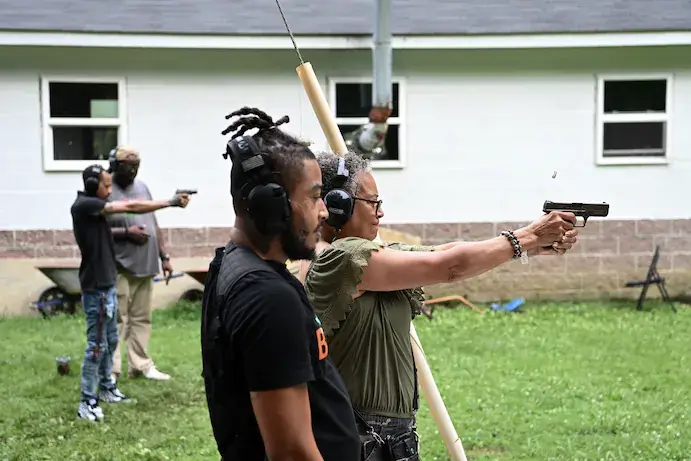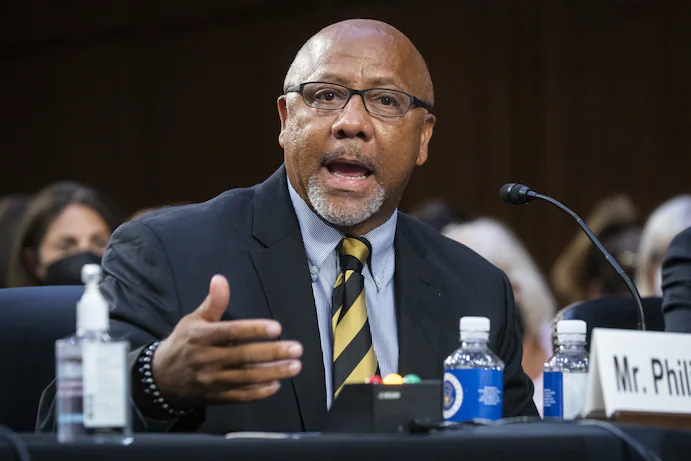WELCOME, Md. — A 16th week had passed with no arrest in the murder of Patrice Parker’s son, another week in which she had struggled through grief for him and fear for herself and her surviving daughters.
It wasn’t just that the person who had turned a gun on 24-year-old Markelle Morrow was still at large, but that so many other armed criminalswere as well.
Shootings were ravaging the nation’s capital, on track for its highest number of homicides in two decades. In Prince George’s County, where Parker lives, carjackings had more than quadrupled since 2019.
But there was a place where she felt safe, and that was here, at a remote property amid thick woods an hour’s drive south of her home in District Heights, Md. And there was no time the 52-year-old felt safer than when holding a weapon like the one her friend Mark “Choppa” Manley now handed her: a 9mm pistol similar to those that regularly ring out in neighborhoods experiencing the worst of the region’s bloody summer.
Story continues below advertisement
“I’ve got some ammo for you,” Manley said, “when you’re ready.”
There was a time when Parker never would have been ready. During a long career as a nursing aide she had cared for countless shooting victims. Like many Black women in Southeast Washington or just across the D.C. border in Prince George’s County, she’d viewed guns for most of her life as the root ofthe violence that had wrecked countless lives in her community.
That changed, paradoxically, after her son was shot to death in a parking lot not far from her home. Exasperated with the police response and in despair over the sheer number of weapons on the streets, Parker decided there was only one way to protect what remained of her family. And that was to pick up a gun herself.
“I always felt like you needed to take the guns off the street. But the way things are now …” Parker’s voice trailed off.
“I don’t feel safe anymore,” she said. “You can’t trust nobody.”

Across America, Black women are taking up arms in unprecedented numbers. Research shows that first-time gun buyers since 2019 have been more likely to be Black and more likely to be female than gun purchasers in previous years, a finding that aligns with surveys of gun sellers.
Gun sales spiked across all demographic groups during the coronavirus pandemic, and remained high through the protests that followed the police murder of George Floyd, the attack on the U.S. Capitol and other events that many saw as signs of a nation in chaos. The National Rifle Association and other gun-industry lobbyists have long exploited such fears to boost sales of firearms and weaken the laws that restrict their use.
But Parker and others like her are part of a new chapter in the long-running story of America’s relationship with firearms. Scarred — sometimes literally — by the firsthand consequences of gun violence and disenchanted with decades of urban gun-control policies that they regard as largely ineffective, some Black women in D.C. and other cities are embracing a view long espoused by Second Amendment activists: that only guns will make them safer.
Story continues below advertisement
It is a development that could upend America’s gun-rights debate, traditionally seen as pitting largely White rural and suburban firearms owners against city residents, many of them Black, whose elected leaders have pursued some of the nation’s strictest gun-control policies.
Nearly 3 in 4 U.S. gun owners are still White, according to a study published by Harvard University researchers earlier this year. And while gun ownership has long been common in rural Black households, the surge of interest in firearms among urban Black women profoundly alarms experts on gun violence, who point to a large body of research demonstrating that gun possession is correlated with a greater — not lesser — risk of violent death. Rates of suicide, the cause of most gun deaths every year, go up when a weapon is in the house, as does the likelihood of accidental death and murder by another household member.
“There is no category of violence where we have evidence to show more firearms increase safety,” said Shani A.L. Buggs, an assistant professor with the Violence Prevention Research Program at the University of California at Davis.
Yet Buggs, a Black woman who previously worked on community violence interventions in Baltimore, acknowledged that a stack of academic papers might not be convincing for a woman who regularly hears gunfire on her street and lives in terror for herself or her children. That is especially the case, she noted, in places like Southeast D.C. or District Heights, where trust in police is often as low as violent crime is high.
“This phenomenon flies in the face of the scientific evidence that we have,” Buggs said. “But it all sadly, tragically, is a predictable outcome of all of these different factors that have been converging.”
Those factors had converged for Parker as she stepped to the firing line on a Sunday in July at the Choppa Community, a Southern Maryland gun range and gathering place for Black firearms enthusiasts. She held a Ruger PC Charger pistol with an extended magazine. She wore a sleeveless black blouse, and a button with the face of her murdered son.
Parker took aim and fired about two dozen rounds at a set of steel targets.
When she laid the gun down, she was smiling.
“I feel a little bit better already,” she said.
‘I wasn’t into guns’

For most of America’s history, the Second Amendment was one of many constitutional rights withheld from those who weren’t White. After the Civil War and emancipation, champions of racial equality encouraged gun ownership among Black citizens to protect themselves from violence perpetrated by Whites.
Those calls were reprised during the civil rights movement of the 1960s, most famously by the militant leaders of the Black Panther Party. In the 1980s, a seminal early victory for the NRA — the spread of state laws that eased restrictions on concealed-carry permits — was also a boon for Black gun enthusiasts, who had frequently had their permit applications denied by White officials.
Yet that trend coincided with another development that dampened enthusiasm for guns in many Black communities: skyrocketing levels of violent crime in cities entering the throes of the crack cocaine epidemic.
As a child growing up in Southeast Washington during that era, Keeon Johnson learned to fear the weapons that routinely ended the lives of her neighbors.
“I wasn’t into guns at all,” Johnson said, “because we were told that guns were bad.”
Decades later, serving as the Democratic chairwoman of an Advisory Neighborhood Commission in Ward 8, Johnson began to wonder whether her faith in her party’s repeated promises of stricter gun control was misplaced. When her husband, originally from South Carolina, began talking about forming a Black men’s gun club in D.C., she went with him to a concealed-carry course.
Johnson, a 36-year-old mother of six, discovered that she was a good shot with a semiautomatic handgun. Soon she was hooked. She and her husband, Frenchie Johnson, took additional courses and became NRA-certified instructors last year. Now they teach classes, catering specifically to Black people from D.C. and Prince George’s, out of their home in White Plains, Md.
In D.C., homicides are up 11 percent from last year and are on track to hit their highest level since 2002. Homicides investigated by Prince George’s County police have dropped more than 30 percent since 2021 — when they reached a 14-year high — but carjackings have continued to rise. In both places, gun seizures by police are up.
One of their first students was Janae Hammett, 37, who had gone to elementary school with Johnson in D.C. and whose children’s father was shot to death in 2010. Given that history, Hammett said she was initially “on eggshells” around guns. But her comfort level increased the more she shot, and eventually she joined Johnson in forming the Second Amendment Sista Society, a club for Black women in the Washington region who are interested in guns.
Hammett said her transformation was driven, fundamentally, by desperation. Illegal guns, it seemed, were everywhere. If she couldn’t count on anyone else to protect her, why shouldn’t she legally own a gun to protect herself?
“I don’t think the government, police or anybody will ever get a hold of the illegal guns,” she said.
Philip Smith, founder and president of the National African American Gun Association, said Hammett has plenty of company on the path she has taken to overcome a deep-seated aversion to firearms.

“More and more African Americans are looking at themselves in the mirror after hearing for years and years that you shouldn’t get a gun for any reason, and saying, ‘You know what, I’m going to get a gun,’ ” Smith said. “This is a movement that has really swept the whole country.”
There is a straightforward logic to this trend. Surveys show that most gun owners buy their weapons for self-protection, and Black Americans are more likely than Whites to have been threatened with a gun or to know someone who has been shot.
Yet Deborah Azrael, director of research at the Harvard Injury Control Research Center, worries that the legitimate fears of people who live with the daily threat of violence are being exploited by an industry eager for new customers.
Story continues below advertisement
“It’s naive not to think that there are gun sellers who have a pecuniary interest in expanding their markets, and in a narrative that says that African Americans and women need guns now more than ever, whether or not that’s something true,” Azrael said.
Azrael said the instinct for self-protection among people who live in dangerous neighborhoods is understandable. But what happens when those instincts combine to create a heavily armed society of the kind that studies show is more dangerous for everybody?
‘The world we live in’
Independence Day weekend was busy at the Choppa Community.
Manley, 32, built the gun range about a year ago with his best friend, Alonzo Stokes. It sits on a property, owned by Stokes’s uncle, off a lonely two-lane road deep in rural Charles County.
Manley grew up in Northeast D.C. and Prince George’s County and previously worked as a bodyguard and operated a security company in the District. One night in November 2018 he fatally shot a masked gunman who, along with three others, was trying to rob a vape shop Manley had been hired to protect. The shooting was ruled justified but his security business license in the District was revoked because the handgun he used wasn’t properly registered.
After a period of soul-searching, Manley decided to enter the budding world of Black Second Amendment influencers. With about 70,000 followers, his gun-heavy Instagram account — currently suspended for an alleged violation of community guidelines that Manley said he does not understand and is appealing — does not yet compare to a popular figure like “Black Rambo.” But Manley said his reach is still such that he has secured sponsorship and ad deals from firearm and ammo companies.
Just as important, he says, is the offline community he has created at the Choppa Community. (“Choppa” is a slang term for guns, often referring to AK-47s.) Nearly 100 people would come and go throughout the day on July 3, all Black and many from D.C. and Prince George’s. Many were women and children. In addition to its gun range, the Choppa Community offers courses in de-escalation strategies, hand-to-hand self-defense and basic firearms safety.
“It’s sad that this is what it’s come to, but this is the world we live in,” Manley said. “Guns aren’t going anywhere.”
The smell of gunpowder mixed with the scent of grilling hamburgers as people sat in lawn chairs, conducting stop-and-go small talk between the sharp reports of AR-15 rifles and 9mm pistols. Among those present was Jawanna Hardy, an Air Force veteran whose nonprofit, Guns Down Friday, works to reduce gun violence and support the families of victims. Hardy had brought with her a group of teen boys from Southeast Washington, some of whom she said had been shot at the day before.
Some have criticized Guns Down Friday for organizing trips to a firing range, she said. But Hardy said those detractors don’t understand the likelihood that the boys she works with will pick up a gun one way or another, and the value in teaching them to responsibly handle the weapons. Beyond that, she said, the enjoyment of shooting and the sense of community at the Choppa range appeal to children whose neighborhoods offer few recreational opportunities.
“I was working with these kids, and I was taking them to program after program after program. Nothing worked,” Hardy said. “And then I took them here. They itch to be here.”
Parker likewise found refuge at the gun range shortly after her son was killed in March.The violent death of Morrow, a well-known rapper whose stage name was Goonew, became national news in the music world, especially after Parker held a memorial for him at a nightclub, propping his embalmed body in a standing position onstage. Parker said she chose the unconventional ceremony to honor her son by placing him above the crowd of mourners. Nobody could look down on him.
Parker, numb with grief, reluctantly agreed to visit the gun range after being invited by Manley, who had been a friend of her son. What she found surprised her.
It wasn’t just the kindness shown to her by Manley and other instructors, the thrill that came from firing a deadly weapon or the fascinating minutiae — firearms’ caliber, model, accessories and ammunition — that enthusiasts discuss endlessly on range days. It was a new worldview that she believed offered her a glimmer of hope. Maybe guns weren’t just the problem. In the right hands, maybe they were also the solution.
As a woman in a dangerous place, she had always feared she would be unable to defend her family. Her son’s killers were still out there. But with a gun, Parker felt less vulnerable, especially with the knowledge she had gained at the Choppa Community.
“They took the fear out of me,” she said.
Story continues below advertisement
Parker was waiting for the paperwork to come through on her concealed-carry license, and in the meantime she was trying to share her revelation with others. On July 3, she brought with her James and Deshonda Johnson, as well as their 5-year-old-daughter. Like Parker, the family lives in District Heights, where a day-care center decided to shut its doors earlier this year because of the gun violence surrounding it.
James, 23, has only one eye. The other was shot out during an attack he survived. He said he was deeply rattled by all the gunfire around him at the Choppa Community, but that rising carjackings and home invasions in his neighborhood had led him to believe proficiency with firearms was the only way to protect his family.
Deshonda, also 23, wasn’t so sure. She had never shot a gun before, and when she stepped to the firing line her hands were sweating so much she could barely hold onto a borrowed pistol.
A male instructor held the gun for her to steady it, and she pulled the trigger, missing a paper target about 10 feet in front of her.
“Oh my God,” she said, breathing rapidly as she pulled her hands from the gun and stepped back. “I’m going, like, crazy. I’m not used to that.”
She took a break and then stepped back to the line, refusing any help this time as she picked up the handgun. Parker stood behind her while she took aim.
“Let it rock, Boo,” Parker said.
Deshonda cupped the gun in her hands as she had been taught, doing her best to ignore the deafening bursts of gunfire that erupted around her. She squeezed off a round, and this time she didn’t flinch.

